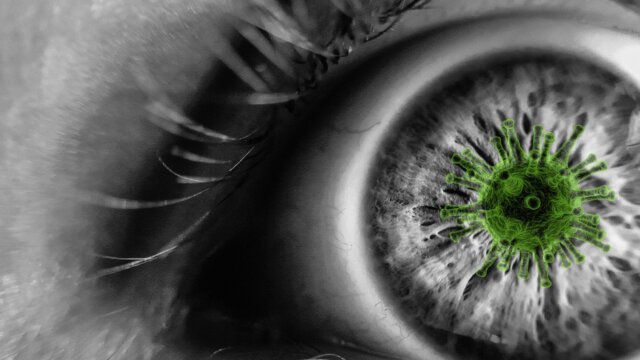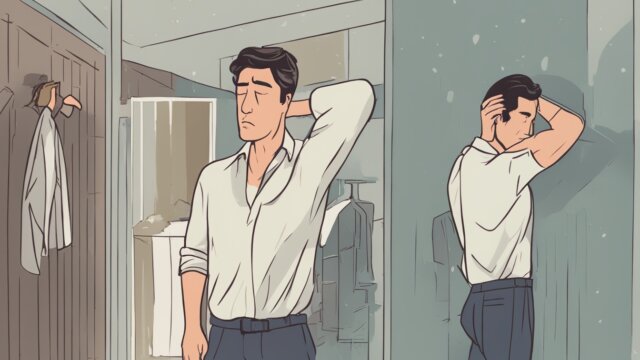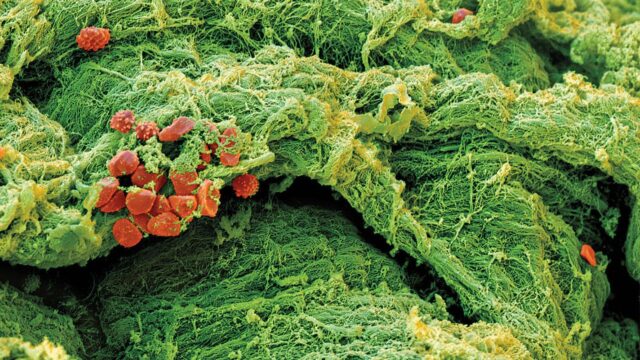FTC disclaimer: This post may contains affiliate links and we will be compensated if you click on a link and make a purchase.
Did you know that some over-the-counter remedies work well for a few people? Earaches are pretty common and really no fun. But thankfully, there are many easy home remedies to help.
This guide looks at how to use simple things you might have around the house to get rid of ear pain. You’ll learn about ice packs, garlic, and more. This way, you can find the best remedy for your earache.
Key Takeaways
- Over-the-counter pain relievers like ibuprofen and acetaminophen can help manage earache pain.
- Sleeping in an upright position is recommended to alleviate pressure buildup in the ear.
- Chiropractic care can be an alternative approach to reducing earache by addressing upper neck misalignments.
- Tea tree oil, when diluted in a carrier oil, can help ease earache due to its antiseptic, antifungal, and anti-inflammatory properties.
- Hydrogen peroxide can aid in removing earwax buildup, a common cause of earache.
What Is an Earache?
An earache is when your ear hurts or feels uncomfortable. It happens a lot and can be from ear infections or problems with earwax. It can also come from issues with the joint that connects your jaw to your skull.
Common Causes of Ear Pain
Ear infections are a big reason why ears ache. They can start from colds, water getting in your ears, or sinus infections. Things like flying, diving, or problems with the TMJ can also make your ears hurt.
Symptoms of an Earache
When you have an earache, your ear might hurt in different ways. You could feel sharp, dull, or throbbing pain. You might also hear poorly, have a ringing sound in your ears, or notice a fever. Kids might pull at their ears, have sleeping or eating troubles, or cry a lot.
“Ear infections in children often start with a cold or other illness and can lead to symptoms like redness, swelling, earache, and fluid in the middle ear.”
Earaches can really bother you and stop you from doing things. It’s very important to get the right help to feel better and avoid any serious problems.
When to See a Doctor
Home remedies can help with some earaches. But, it’s key to know when to get help from a doctor. See one if your earache is really bad, you have a high fever, or the pain lasts over 48 hours. These signs might mean you need quick treatment for a more severe issue.
If fluid or pus comes out of your ear, see a doctor right away. This could show a serious infection. Also, if the pain keeps you up at night or stops you from doing usual things, it’s time to talk to a doctor.
Some health problems can make earaches worse. For example, allergies can cause pressure in the ear. Meniere’s disease leads to dizziness and ear buzzing. If home treatments don’t help, seeing a doctor is the next step. They can find and treat the main issue behind your earache.
If you have a fever, neck pain, or swollen spots near your ears, get medical help fast. These signs could mean a serious infection. A doctor might give you medicine that clears the problem quickly. This can stop more health troubles, like hearing loss or the infection spreading.
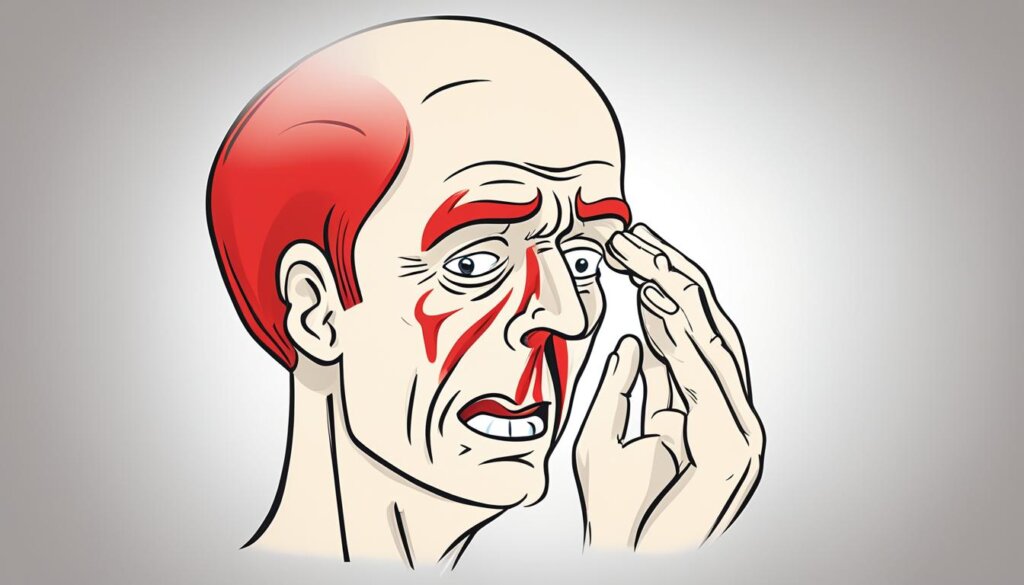
Handling earaches at home is okay in many cases. But, it’s vital to watch your symptoms closely. Get professional help as needed. Quick care for earaches can prevent bigger issues and help you recover faster.
Quick Home Remedies for Earache
Having an earache can be very uncomfortable. Luckily, there are many home remedies you can try. For example, you can use a cold compress or garlic. These are easy ways to help with ear pain without needing a doctor’s medicine.
Ice Pack for Earache Relief
Using a cold compress is a fast way to feel better from an earache. The cold can lower swelling and make the pain less. Wrap some ice in a soft cloth, then hold it by your ear for 20 minutes. Remember, never put ice straight onto your skin.
Garlic as a Natural Antibiotic
Garlic has been known for its powers against bacteria, which makes it a great earache remedy. You can eat more raw garlic or put garlic oil near your ear. These actions can fight the infection that’s causing your discomfort.
Remember, garlic can make you feel better, but it’s not a replacement for seeing a doctor. Always talk to a healthcare expert before trying garlic or other home remedies. This is especially true if you often get ear infections or have other health issues.
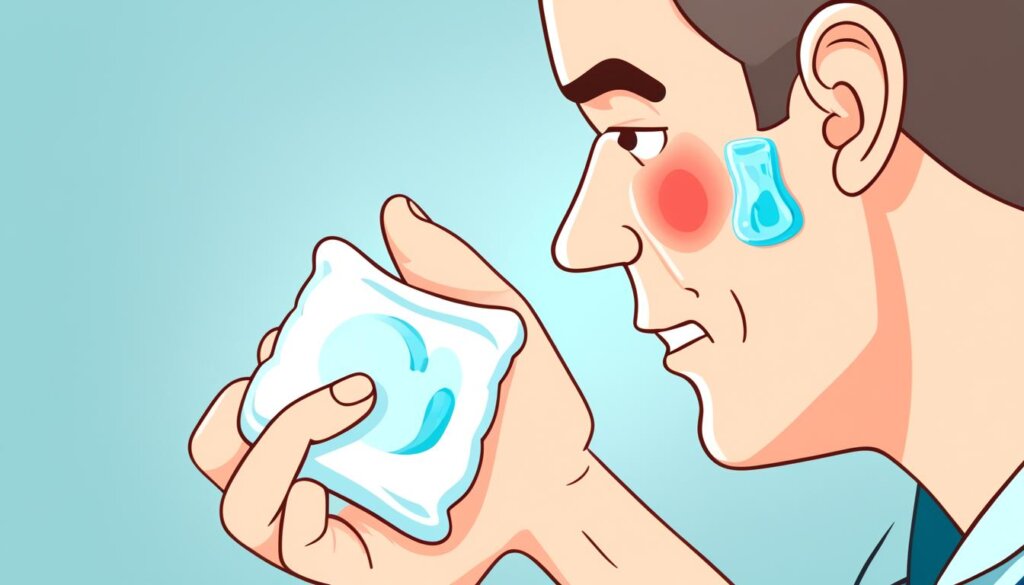
“Applying a cold compress or ice pack to the affected ear can help reduce inflammation and numb the pain.”
Heating Pad for Earache
Warmth from a heating pad or warm compress can soothe an earache. It relaxes the ear muscles and boosts blood flow, easing pain and pressure. Use a warm, not too hot, heat and limit time to 20 minutes.
Ear pain is often from infections in kids and young adults. A long-lasting ear infection, over a week, might need a doctor. This is especially true if the outer ear looks bad and might need antibiotics. Heating pads can make this kind of situation less painful.
Be careful with heating pads to avoid burns or more ear problems. It’s best to start at a low temperature and slowly turn it up if you need to. But it should always be just warm, not too hot.
If ear infections go away on their own, using home treatments is fine, says Dr. Rockwell. Stubborn infections might need pain medicine like Tylenol or Advil. These can help with the hurt and fever.
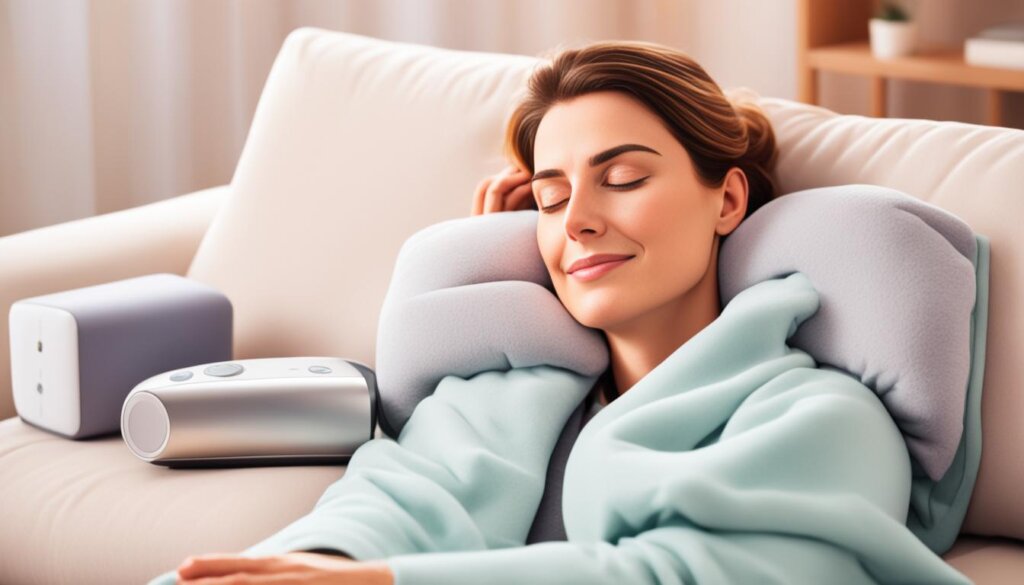
Mixing heat and cold can also treat earache pain. The warm pad relaxes muscles, while the cold lessens swelling. This mix can help a lot with earache symptoms.
If an earache doesn’t get better, see a doctor. Untreated ear infections can lead to big problems. By using heating pads wisely and getting help when needed, earache pain can be managed.
Over-the-Counter Ear Drops and Pain Relievers
Having an earache is tough, but there are OTC options to help. Choices like ibuprofen or acetaminophen can reduce pain and swelling. Some ear drops can also ease discomfort, but talk to your doctor first if you have a ruptured eardrum.
Drops available without a prescription can do many things. They can dry the ear, calm pain, get rid of earwax, and stop itching. You’ll find items like mineral oil, glycerin, and baking soda in them. Brands like Polysporin and Murine are known for ear pain and wax removal.
But, not all drops work the same, and a few might make things worse. If you’re not better in a few days or if it gets worse, see a doctor. Doctors may need to give you antibiotics for a really bad ear infection.
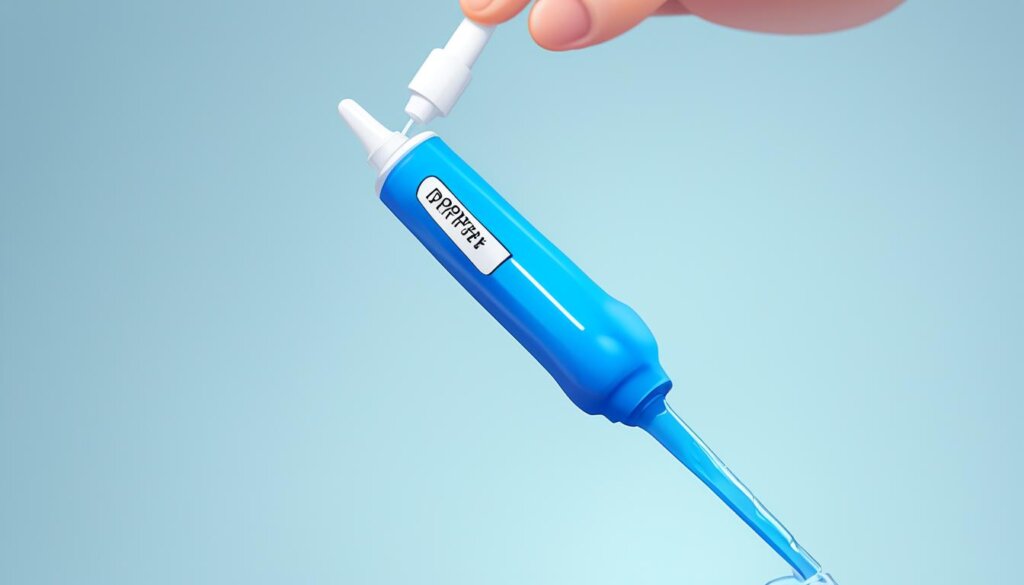
Though OTC meds help for a bit, talking to a doctor is crucial, especially if your eardrum is damaged or if symptoms don’t go away. Getting the right care is important for a fast recovery and to avoid any big problems later.
Sleeping Upright for Ear Pain
Finding a comfy way to sleep can really help an earache. Try sleeping sitting up a bit. It lets fluid move out of your ear and lowers pressure in the middle ear.
Put extra pillows under you or sit in a recliner. Make sure your bad ear is higher than your other ear. This can cut down pain by helping your ear drain better.
Sleeping this way also makes you feel less worried. It’s hard to sleep when your ear hurts. But, using pillows or a recliner makes it easier to rest. This can help lower your stress about the pain.
Yet, not everyone can sleep this way. Some people can’t stay lifted all night. If you have health issues or can’t move much, talk to a doctor. They can give you other ideas to help your earache better.
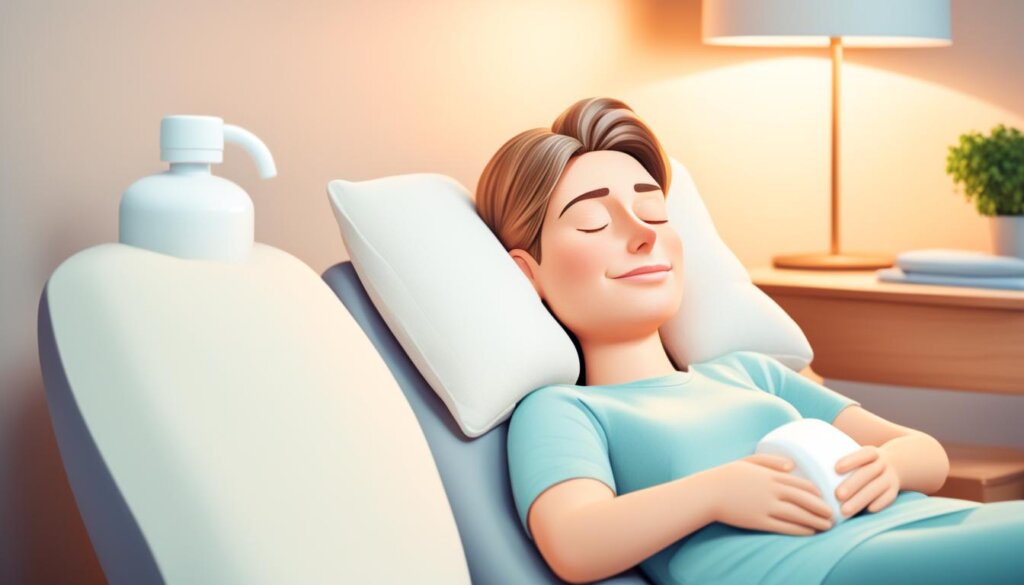
There isn’t one perfect way to sleep for ear pain. You might need to try different things. With some pillows or a good recliner, you might find what works for you. Then, your earache might get better.
Chewing Gum to Pop Your Ears
If you have an earache, chewing gum is an easy fix. Ear barotrauma happens often when sick or when the air pressure changes. This is common during flights or when diving. It causes ear discomfort and pressure. Chewing gum helps by opening the Eustachian tubes. This balances the pressure in your ears, offering relief.
Chewing stimulates the Eustachian tube muscles. This lets air flow better and equalizes ear pressure. It’s great for kids who can’t clear their ears the usual way. They might find it hard to swallow or move their jaws to pop their ears.
Besides gum, there are other ways to pop your ears. You can try the Valsalva and Toynbee maneuvers. The Valsalva way, where you close your nose, shut your mouth, and blow gently, is better than Toynbee’s method. Toynbee’s involves swallowing with your nose pinched. Certain devices, like earplugs that regulate air pressure, or Otovent, and EarPopper can also help. They are useful for people who can’t use their hands to open their ears.
Always see a doctor if your ear feels blocked for a long time. They might suggest medicine, like decongestants or antibiotics, for serious cases. Sometimes surgery might be an option. Understanding what causes ear pain and how to deal with it is crucial. It helps you take care of your ears properly.

Gum can help, but keep things out of your ear canal. This could hurt you. Instead, try safe ways like yawning, swallowing, and other maneuvers to ease ear pressure.
Distraction Techniques for Earache
Hurting from an earache can seem worse if you only think about the pain. To help, try to keep your mind off the ache. You can play games, watch TV, or do some exercise. This tip really works well for kids with earaches. It makes them feel less pain.
Listening to music or podcasts is a good way to distract yourself. Studies show music can make you feel less pain. Chewing gum helps too. It keeps your jaw busy, which can take your mind off the ache.
For kids, fun things like video games or reading a favorite book can really help. These activities distract them from the earache. It makes it easier for them to handle the pain.
Also, putting pressure on specific spots can briefly lessen earache pain. The spot just under the skull at the back is one of these points. It can help relax you and might even stop a headache from stress or being tired.
But, it’s key to not just rely on distractions for earache problems. If the pain lasts over two days, or if it’s a child feeling it, see a doctor.

“Staying distracted can reduce pain associated with ear infections based on studies showing that increased distraction leads to decreased perception of pain.” – Singlecare
Chiropractic Care for Ear Pain
Do you have long-lasting ear pain? Chiropractic care might help you naturally and effectively. This treatment believes that neck vertebrae misalignment can affect the Eustachian tube and fluid flow in the ear, leading to pain. By using special methods like cranial sacral manipulation, Muncie technique, and ear adjustments, chiropractors aim to realign the neck. This helps ears work better.
Chiropractic care looks deeper into earaches instead of just easing the symptoms. This alternative treatment not only soothes you but also helps keep ear infections away. It has been found to lower the use of drugs and surgeries. So, it’s a gentle and natural way to care for your ears.
If you think chiropractic care might help your earache, find a skilled chiropractor. They will check your condition and make a plan just for you. They might also use natural ear drops with ingredients like garlic, calendula, and St. John’s wort. This gives you complete help.
Along with chiropractic care, you can try other natural ways to ease ear pain. Homeopathic remedies like Oscillococcinum and Ferrum phosphoricum are a good choice. You can use these with standard medical treatments or by themselves for mild earaches.
Chiropractic care, along with other alternatives, offers a full way to treat ear pain. These treatments focus on the problem’s root and offer safe comfort.
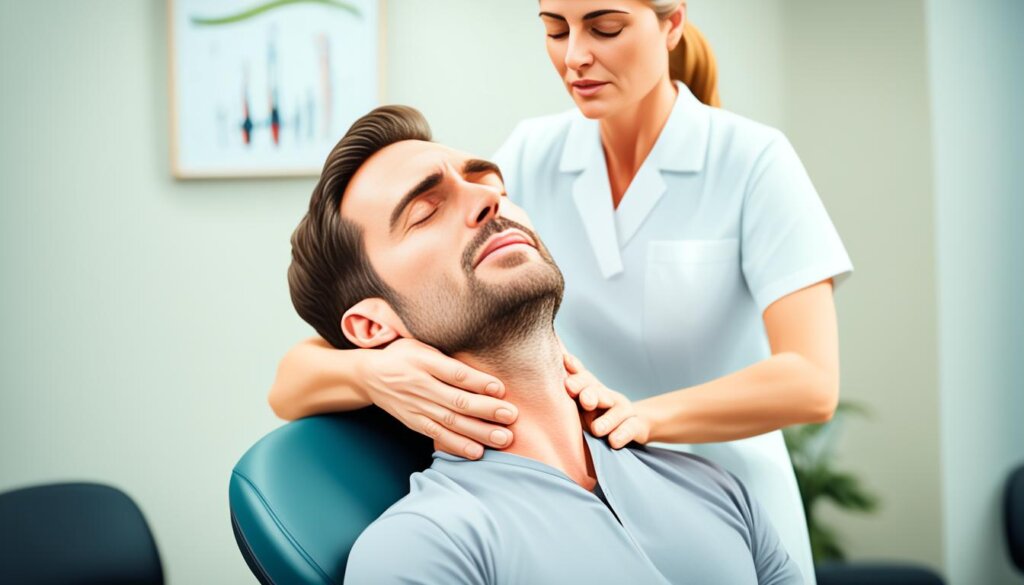
If your ear pain is severe or won’t go away, see a doctor. They will find what’s wrong and suggest the best way to treat it, either the usual way or with alternatives.
Tea Tree Oil for Earache Relief
Looking for a natural way to calm an earache? Consider using tea tree oil. It has antimicrobial, antifungal, and anti-inflammatory powers, which might help with ear pain. Mix a little tea tree oil with olive or almond oil. Then, gently put it on the outside of your ear. Always check for allergies first.
We need more studies to know if tea tree oil really helps with human ear infections. For safety, mix 1 part essential oil with 1 teaspoon of carrier oil. Be careful if you want to try this on kids, pregnant women, or those who are breastfeeding. It’s best to talk to a doctor first.
If the eardrum is damaged, do not use essential oils. You might want to see a doctor. Using too much oil at once can block your ear. So remember, a little goes a long way.
Tea tree oil might ease your ear pain a bit. But it’s not a substitute for seeing a doctor. If your ear still hurts or gets worse, seeing a doctor is important.

“Tea tree oil contains terpinen-4-ol, which has potent antibacterial properties, making it potentially more effective than some antibacterial cleaning agents.”
Neck Exercises for Earache
If your ear hurts because of tension near the ear, try gentle neck exercises. These exercises can lessen the pressure and pain. Specialists in Los Angeles advise neck exercises to help with ear canal pressure.
Stretches to Ease Ear Pain
Begin by rotating your head slowly in circles. Be careful not to overdo it. Then, move your ear towards your shoulder, and hold. Also, opening your mouth wide may help with the pain. Moreover, 13.4% of people find relief from earache through neck exercises.
These easy neck movements can calm the muscles and reduce pain from earaches. Seek a doctor if the pain lingers. If ear pain doesn’t go away in 24 to 48 hours, you should see an ENT specialist.
“Addressing neck tension can be an effective way to alleviate ear pain and pressure.”
Treating the root problem is key for lasting relief, not just quick fixes. Use neck exercises and get help from experts as needed.
Hydrogen Peroxide for Earwax Buildup
Excess earwax buildup often causes earaches. It leads to pressure and blockages in the ear canal. A simple remedy with hydrogen peroxide can dissolve and remove stubborn earwax.
To use hydrogen peroxide, lie on your side. Then, put a few drops of it in your ear. Let it work for a few minutes. Afterward, tilt your head to let the liquid and loosened wax come out. Always rinse your ear well.
Over-the-counter solutions contain 3% hydrogen peroxide. You might need to use these solutions more than once a day for several days. This depends on the product. But, if you have any problems like ear drainage or pain, see a doctor.
Using hydrogen peroxide needs some care. It might cause ear canal irritation. Also itchiness, pain, and rarely a skin reaction. If you’re not sure if it’s safe for you, ask a doctor first.
If you often need to clean your ears, see an ear doctor. It could signal a deeper problem.
So, hydrogen peroxide is good for earwax. But, it must be used carefully with a doctor’s advice. Knowing how to use it and the risks makes ear care better and pain go away.
Ginger for Anti-Inflammatory Properties
Ginger can help lessen inflammation and reduce earache pain. It’s a natural anti-inflammatory offering relief from earaches. The properties of ginger lower inflammation in the ears, easing pain from infections. Applying some ginger juice around the outer ear helps. But, don’t let it touch the inside to avoid irritation.
Ginger is strong against pain and inflammation, making it great for earaches. It has Gingerol and Shogaol that work as anti-inflammatories. These can lower swelling and pain. Using it around the ear might soothe an earache.
For the best outcome, you can make a ginger compress by soaking a cloth in ginger water. Then, put it on the ear. This method is gentle and free from most side effects. However, make sure it does not go into the ear, preventing irritation.
Ginger’s benefits go beyond inflammation, possibly fighting infection too. By adding ginger to your treatment, you may get relief without prescription drugs. This makes it a safe and efficient option.
Other Home Remedies for Earache
Using an ice pack or putting garlic can help with ear pain. You can also try remedies like olive oil, onion, and salt. These methods are often safe and easy to do at home.
Some studies show that herbal ear drops work as well as doctor’s drops. Putting a warm cloth on the ear for 20 minutes may also help with the ache, especially for kids.
Acetaminophen and ibuprofen can make the pain go away quickly. Make sure to use the right one for age. Acetaminophen is for babies under 6 months, and ibuprofen is for older kids.
Drying eardrops are useful for swimmer’s ear. Hydrogen peroxide can treat ear infections in grown-ups carefully. Rinsing with salt water is also good if your ear is swollen.
If home treatments don’t help in a few days, contact a doctor. Ear infections can get worse if not treated soon.
Remember, while these remedies are helpful, seeing a doctor is the best next step. They can figure out the real problem and give you the best care for fast healing.
Common Natural Remedies for Earache
Besides tea tree oil, other home remedies could help with earaches. Here are a few:
- Rubbing alcohol kills 85% of certain bacteria
- Garlic is strong against germs
- Olive oil helps with earwax buildup
- Apple cider vinegar fights off some bacteria and fungi
- A salt compress might ease pain and swelling
- Basil is rich in antioxidants and fights germs
We’re not entirely sure how well these natural options work against ear infections. Always ask a doctor before trying home remedies. This is very important if your eardrum is harmed or if the infection is bad.
Natural Remedy | Potential Benefits | Cautions |
|---|---|---|
Tea Tree Oil | Antimicrobial, antifungal, anti-inflammatory properties | Perform patch test, dilute properly, avoid use on children, pregnant/breastfeeding women, and ruptured eardrums |
Rubbing Alcohol | Eradicates 85% of aerobic bacterial contamination | Use with caution, may cause drying |
Garlic | Potent antimicrobial properties | Effectiveness for ear infections not conclusively proven |
Olive Oil | Softens earwax | May not treat underlying infection |
Apple Cider Vinegar | Antibacterial and antifungal properties | Safety and efficacy for ear infections not conclusively proven |
These home remedies might help your earache a little. But if the pain doesn’t go away or gets worse, see a doctor. Getting the right treatment is key to avoid further problems.
Conclusion
Earaches are common and sometimes hurt a lot. But, you can try many home remedies for quick relief. Methods like using ice packs, heating pads, and natural things might help. These include garlic, ginger, and hydrogen peroxide.
Always talk to a doctor if your ear hurts for a long time or gets worse. Some earaches need special medical care. Trying natural treatments for earache can help you feel better.
The ideas in this article can help right away. But, if the pain is really bad or you have other bad signs, see a doctor. Earaches that don’t go away or get worse could be a sign of something more serious. This might need a doctor’s advice and treatment.
Learn why earaches happen and try these effective natural treatments for earache. Doing this can help you avoid needing serious medical help. Be patient and follow the advice here. You can feel better and go back to your regular life.
FAQ
What is an earache?
An earache means pain in the ear. It can happen because of infections, earwax, air pressure, or issues with the TMJ joint.
What are the symptoms of an earache?
Symptoms include pain types like sharp or dull, muffled hearing, and ear ringing. Some might get fever or ear drainage too.
When should I see a doctor for an earache?
See a doctor if the pain is strong, you have a high fever, or if it lasts over 48 hours. Also, if you see fluid or pus from the ear.
How can I use an ice pack to relieve earache pain?
Use an ice pack on the ear for 20 minutes. It helps to reduce swelling and makes the pain go away for a bit.
How does garlic help with earaches?
Garlic fights bacteria well. You can eat it raw or put garlic oil by your ear. This can help with pain.
How can a heating pad or warm compress help with an earache?
Warmth relaxes ear muscles and improves blood flow. This lowers pain and the feeling of pressure. Use it warm, not hot, and not more than 20 minutes at a time.
What over-the-counter medications can help with earache pain?
Medicine like ibuprofen or acetaminophen is good for ear pain. They lower swelling and lessen pain. Ear drops can also help but check with a doctor first if your eardrum is broken.
How can sleeping in an upright position help with an earache?
It can help fluid in the ear drain better and reduce the pressure causing pain. You should sleep a bit upright for this.
How does chewing gum help with earache caused by changes in air pressure?
Chewing gum helps unblock the ears by opening the tubes. This lets air move freely and reduces pressure.
How can distraction techniques help with earache pain?
Keep busy with games, TV, or exercise. This way, you don’t think so much about the earache and it feels less painful.
How can chiropractic care help with earaches?
The upper neck’s bones can sometimes press on nerves causing ear pain. A chiropractor can adjust these bones to help the ear drain better and reduce pain.
How can tea tree oil be used to treat earaches?
Tea tree oil is antibacterial and anti-inflammatory. Mix a few drops with a carrier oil and put it outside the ear.
What other home remedies can be used for earaches?
You can try olive oil, onion, salt, vinegar, and hydrogen peroxide. They’re safe to use at home if you follow the right steps.
How can neck exercises and stretches help with earache?
Neck movements can relax the muscles near the ear. This could lower pressure and pain from an earache.
How can hydrogen peroxide help with earwax buildup and earache?
A few drops of hydrogen peroxide can clear out earwax. This helps with pressure and ache by opening the ear canal.
How can ginger help with earache relief?
Ginger can lower swelling and pain. Put a little ginger juice outside the ear for healing.

